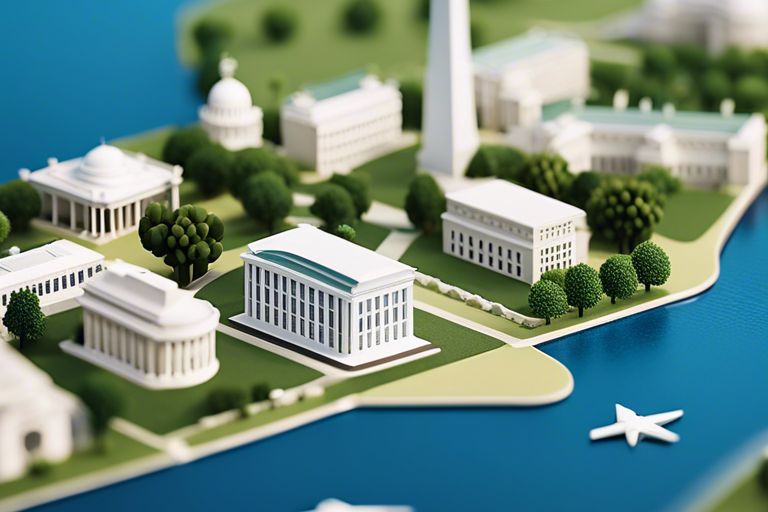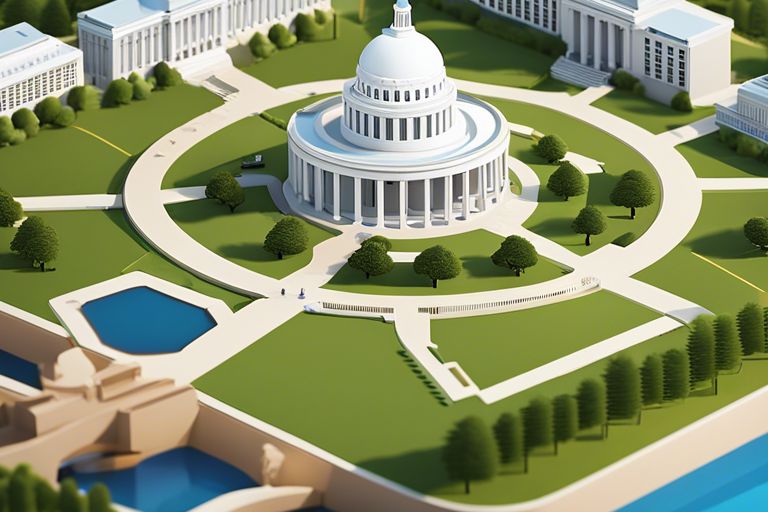Many would be surprised to learn that Washington, DC is home to over 175 embassies, ambassador’s residences, and international cultural centers, making it one of the most culturally diverse cities in the nation. Located along Massachusetts Avenue NW between 18th and 35th streets, Embassy Row is a prime location for a walking tour to explore the array of embassies from countries across the globe. This blog post serves as a comprehensive guide for visitors and diplomats, offering information on how to navigate the embassies, participate in cultural events, and experience various international cuisines, music, and art right within the nation’s capital.
Key Takeaways:
- Embassy Row: Massachusetts Avenue NW between 18th and 35th streets is known as Embassy Row, where you can find a concentration of major embassies.
- Passport DC: During May, Cultural Tourism DC’s Passport DC program allows the public to tour multiple embassies and experience different cultures through music, food, art, dance, and fashion.
- Embassy Events: Throughout the year, embassies in DC host concerts, exhibitions, lectures, and other cultural programs that provide an inside look into various countries and their traditions.
- Embassy Series: Offers concerts in partnership with DC embassies, providing a unique experience of musical performances followed by elegant receptions within embassy or ambassador’s residence.
- Cultural Centers: Various cultural centers in DC, such as Goethe Institut, Mexican Cultural Institute, House of Sweden, Casa Italiana, and Maison Francais, host events including cooking classes and concerts to showcase different cultures.
- International Club DC: Provides schedules for special events at embassies, allowing visitors to participate in unique cultural activities throughout the year.
- Free International Activities: Discover free international activities in the District to continue exploring different cultures while in Washington, DC.

Navigating the Embassy Landscape
Embassy Row: A Hub of Diplomatic Activity
Some of the world’s most prominent embassies can be found along Massachusetts Avenue NW between 18th and 35th streets, also known as Embassy Row. With over 175 embassies, ambassador’s residences, and cultural centers, Washington, DC offers a diverse and vibrant representation of global diplomacy right within its borders. Embassy Row is a must-visit destination for those interested in learning more about international relations and experiencing the cultural richness of different countries.
Mapping the Embassies: Strategies for Visitors
The embassies in Washington, DC are spread across the city, but a large concentration can be found on Embassy Row. For visitors looking to explore these diplomatic sites, creating a strategic map to maximize their tour is crucial. Understanding the layout of the embassies and planning a route can enhance the overall experience and allow visitors to make the most of their time exploring the diverse cultural offerings of the different countries represented in the District.
Cultural Events and Open Houses
Passport DC: A Month-Long Celebration of Global Cultures
Little known to many, Washington, DC hosts a month-long celebration of global cultures known as Passport DC. During the month of May, over 175 embassies open their doors to the public, offering a unique opportunity to experience the music, food, art, dance, and fashion of different countries all in one city. This annual event, organized by Cultural Tourism DC, is a highly anticipated series that allows visitors and locals alike to immerse themselves in the diverse world of diplomatic Washington.
Year-Round Embassy Events and Cultural Series
MonthLong In addition to the Passport DC festivities, Washington, DC offers a variety of year-round embassy events and cultural series for those eager to explore international culture. The Embassy Series hosts concerts in collaboration with DC embassies, providing patrons with the chance to enjoy music from around the world followed by receptions in elegant embassy settings. Numerous embassies also host special events such as concerts, exhibitions, and lectures throughout the year, allowing visitors to further examine into the cultural tapestry woven within the city’s diplomatic community.

Diplomatic Resources and Visitor Information
Essential Tips for Visiting an Embassy
Keep in mind that when visiting an embassy, it is important to dress appropriately and follow any security protocols in place. It is recommended to bring a form of identification and be prepared for potential wait times. Additionally, visitors should be respectful of the embassy staff and the premises. Perceiving the embassy as a representation of a foreign nation, courtesy and professionalism are key during your visit.
- Dress appropriately
- Bring identification
- Be respectful of staff and premises
Resources for Diplomats and Foreign Representatives
Representatives from countries across the globe live and work for their home embassy right here in the District, making diplomatic resources in Washington, DC vital for their daily activities. Embassies offer cultural events, concerts, exhibitions, and lectures throughout the year. These resources not only enhance cultural exchange but also strengthen international relations. Diplomats and foreign representatives can also access various programs and events organized by cultural centers such as the Goethe Institut, the Mexican Cultural Institute, and others to engage with the local community and promote cross-cultural dialogue.
Exploring International Culture Beyond Embassy Walls
Cultural Institutes and Their Role in Cultural Exchange
For a deeper examine international culture beyond embassy walls, visitors in Washington, DC can explore various cultural institutes. These institutes, such as Germany’s Goethe-Institut and the Mexican Cultural Institute, serve as hubs for cultural exchange, offering events ranging from cooking classes to concerts. They play a crucial role in fostering cross-cultural understanding and appreciation among residents and visitors alike.
Popular Multicultural Events and Festivals in DC
Washington, DC is host to a plethora of multicultural events and festivals throughout the year, showcasing the diverse cultural tapestry of the city. Events like Passport DC, where dozens of embassies open their doors, the National Asian Heritage Festival, as well as the Embassy Series concerts, provide unique opportunities to experience the music, food, art, and traditions of various countries right within the city limits. These events not only celebrate diversity but also promote cultural awareness and understanding among attendees.
Summing up
Taking this into account, exploring the international embassies in Washington, DC offers a unique opportunity to experience different cultures and traditions without leaving the city. From Embassy Row along Massachusetts Avenue to the annual Passport DC events, there are numerous ways for visitors and locals to engage with diplomats and learn more about countries from around the world. With a plethora of cultural events, concerts, exhibitions, and lectures hosted by embassies and cultural centers throughout the year, there is no shortage of opportunities to immerse oneself in global experiences right here in the nation’s capital.
Q: What is the significance of international embassies in Washington, DC?
A: International embassies in Washington, DC play a crucial role in representing their home countries, facilitating diplomatic relations, and promoting cultural exchange.
Q: Where can I find the embassies in Washington, DC?
A: The embassies are scattered across the city, with a concentration along Massachusetts Avenue NW between 18th and 35th streets, known as Embassy Row.
Q: What is Passport DC?
A: Passport DC is an annual event organized by Cultural Tourism DC, where dozens of embassies open their doors to the public for cultural tours and experiences throughout the month of May.
Q: What events can I attend at the embassies throughout the year?
A: In addition to Passport DC, embassies host various cultural programs such as concerts, exhibitions, lectures, and special events like Embassy Chef Challenge.
Q: How can I participate in cultural programs at the embassies?
A: You can attend events hosted by the Embassy Series, which includes concerts and receptions in partnership with DC’s embassies. Tickets are usually required for these events.
Q: Are there other cultural centers in DC that host international events?
A: Yes, cultural centers like the Goethe Institut, Mexican Cultural Institute, House of Sweden, Casa Italiana, and Maison Francais in DC also host a variety of events ranging from cooking classes to concerts.
Q: What are some free international activities I can enjoy in Washington, DC?
A: There are plenty of free international activities in DC, including embassy tours, cultural festivals, and events hosted by various cultural centers. Check out our recommendations for more information.
Applicable in All World Countries listed below.
Afghanistan, Albania, Algeria, Andorra, Angola, Antigua and Barbuda, Argentina, Armenia, Australia, Austria, Azerbaijan, Bahamas, Bahrain, Bangladesh, Barbados, Belarus, Belgium, Belize, Benin, Bhutan, Bolivia, Bosnia and Herzegovina, Botswana, Brazil, Brunei, Bulgaria, Burkina Faso, Burundi, Cabo Verde, Cambodia, Cameroon, Canada, Central African Republic, Chad, Chile, China, Colombia, Comoros, Congo, Costa Rica, Côte d’Ivoire, Croatia, Cuba, Cyprus, Czech Republic, Denmark, Djibouti, Dominica, Dominican Republic, East Timor (Timor-Leste), Ecuador, Egypt, El Salvador, Equatorial Guinea, Eritrea, Estonia, Eswatini, Ethiopia, Fiji, Finland, France, Gabon, Gambia, Georgia, Germany, Ghana, Greece, Grenada, Guatemala, Guinea, Guinea-Bissau, Guyana, Haiti, Honduras, Hungary, Iceland, India, Indonesia, Iran, Iraq, Ireland, Israel, Italy, Jamaica, Japan, Jordan, Kazakhstan, Kenya, Kiribati, Korea, North, Korea, South, Kosovo, Kuwait, Kyrgyzstan, Laos, Latvia, Lebanon, Lesotho, Liberia, Libya, Liechtenstein, Lithuania, Luxembourg, Madagascar, Malawi, Malaysia, Maldives, Mali, Malta, Marshall Islands, Mauritania, Mauritius, Mexico, Micronesia, Moldova, Monaco, Mongolia, Montenegro, Morocco, Mozambique, Myanmar (Burma), Namibia, Nauru, Nepal, Netherlands, New Zealand, Nicaragua, Niger, Nigeria, North Macedonia, Norway, Oman, Pakistan, Palau, Panama, Papua New Guinea, Paraguay, Peru, Philippines, Poland, Portugal, Qatar, Romania, Russia, Rwanda, Saint Kitts and Nevis, Saint Lucia, Saint Vincent and the Grenadines, Samoa, San Marino, Sao Tome and Principe, Saudi Arabia, Senegal, Serbia, Seychelles, Sierra Leone, Singapore, Slovakia, Slovenia, Solomon Islands, Somalia, South Africa, South Sudan, Spain, Sri Lanka, Sudan, Suriname, Sweden, Switzerland, Syria, Taiwan, Tajikistan, Tanzania, Thailand, Togo, Tonga, Trinidad and Tobago, Tunisia, Turkey, Turkmenistan, Tuvalu, Uganda, Ukraine, United Arab Emirates, United Kingdom, United States, Uruguay, Uzbekistan, Vanuatu, Vatican City, Venezuela, Vietnam, Yemen, Zambia, Zimbabwe.